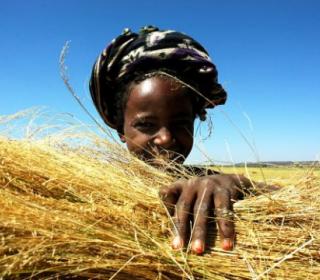Focal point
Location
About IFPRI
The International Food Policy Research Institute (IFPRI) provides research-based policy solutions to sustainably reduce poverty and end hunger and malnutrition in developing countries. Established in 1975, IFPRI currently has more than 500 employees working in over 50 countries. It is a research center of theCGIAR Consortium, a worldwide partnership engaged in agricultural research for development.
Vision and Mission
IFPRI’s vision is a world free of hunger and malnutrition. Its mission is to provide research-based policy solutions that sustainably reduce poverty and end hunger and malnutrition.
What We Do
Research at IFPRI focuses on six strategic areas:
- Ensuring Sustainable Food Production: IFPRI’s research analyzes options for policies, institutions, innovations, and technologies that can advance sustainable food production in a context of resource scarcity, threats to biodiversity, and climate change. READ MORE
- Promoting Healthy Food Systems: IFPRI examines how to improve diet quality and nutrition for the poor, focusing particularly on women and children, and works to create synergies among the three vital components of the food system: agriculture, health, and nutrition. READ MORE
- Improving Markets and Trade: IFPRI’s research focuses on strengthening markets and correcting market failures to enhance the benefits from market participation for small-scale farmers. READ MORE
- Transforming Agriculture: The aim of IFPRI’s research in this area is to improve development strategies to ensure broad-based rural growth and to accelerate the transformation from low-income, rural, agriculture-based economies to high-income, more urbanized, and industrial service-based ones. READ MORE
- Building Resilience: IFPRI’s research explores the causes and impacts of environmental, political, and economic shocks that can affect food security, nutrition, health, and well-being and evaluates interventions designed to enhance resilience at various levels. READ MORE
- Strengthening Institutions and Governance: IFPRI’s research on institutions centers on collective action in management of natural resources and farmer organizations. Its governance-focused research examines the political economy of agricultural policymaking, the degree of state capacity and political will required for achieving economic transformation, and the impacts of different governance arrangements.
Research on gender cuts across all six areas, because understanding the relationships between women and men can illuminate the pathway to sustainable and inclusive economic development.
IFPRI also leads two CGIAR Research Programs (CRPs): Policies, Institutions, and Markets (PIM) andAgriculture for Nutrition and Health (A4NH).
Beyond research, IFPRI’s work includes partnerships, communications, and capacity strengthening. The Institute collaborates with development implementers, public institutions, the private sector, farmers’ organizations, and other partners around the world.
Resources
Displaying 356 - 360 of 1521Trends in public agricultural spending in Swaziland
Swaziland as a developing middle income country has continuously sought to create an enabling environment for the development of the agricultural sector. The country has enacted policies and strategies together with programs to facilitate the attainment of growth targets in the agricultural sector (World Bank, 2011). Consequently, this will lead to the attainment of the Comprehensive Africa Agriculture Development Program (CAADP) targets, Millennium Development Goals (MDGs) and facilitate economic growth.
The role of fertilizers in transforming of agriculture in Asia: A case study of Indian fertilizer sector
The contribution of chemical fertilizers towards increased agricultural production is well established. Indian agricultural policy focused on increasing productivity and modern inputs such as improved seeds (HYVs), irrigation, chemical fertilizers, etc. have played an important role in increasing crop production and productivity. Increased fertilizer use will continue to play an important role in increasing agricultural productivity given the diminishing land available for cultivation.
Investigating the impact of climate change on agricultural production in eastern and southern African countries
Climate change has been a significant issue since the end of the 20th century, and impacts a variety of economic sectors, primarily agriculture. The negative impacts of climate change on agricultural production are important because agriculture is closely linked to food security. Although they contribute the least to global pollution, it is estimated that African countries will be the most affected by climate variability.
Knowledge systems and networks for nutrition in India: A review
The first part of this review provides an overview of the current nutrition knowledge landscape in India based on the secondary research conducted on the existing knowledge systems and networks catering to nutrition-based information needs of policymaking audiences in India. The second section of the report shares the outcomes of face-to-face interviews conducted with the conveners of these knowledge networks. It also shares the findings from the interviews with decisionmakers and program implementers and impres-sions of these networks from a user perspective.




